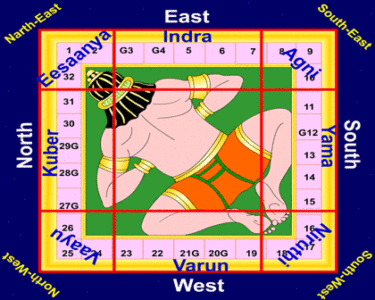

The term ‘vaastu’ is derived from Sanskrit ‘vasu’, meaning ‘earth’ and the word ‘shastra’ meaning ‘science’.
It is an ancient Hindu science of construction and formed a crucial guiding system for the construction of any structure. Its practice started from the Vedic period and was widely used to build a property which would be auspicious and bring prosperity, happiness and health to the residents.
History in construction
In ancient times, Vaastu Shastra was used in town planning and the construction of temples for its detailed methodology of designing and structuring buildings and buying land for maximizing benefits for the buyer. A revival of interest and extensive use of this 5000-year-old method has been noticed since the mid 90’s to provide maximum advantage to homeowners and proprietors of commercial constructions.
Five elements
According to Vaastu Shastra our world comprises of five basic elements. Earth has life because of the presence of these five elements. Harmony of these five elements in our body and environment keeps us healthy and active while any disturbance in the equilibrium devitalizes us. Vaastu Shastra provides the ancient knowledge which instructs how to maintain the equilibrium of these five elements in a building and make best use of them to energize mental and physical energies of inhabitants.
How can Vastu help in selecting the correct property?
If one is purchasing a constructed house or building, it is best if the main structure is in the centre of the plot. If it is a rectangular plot, the structure should be closer to South, South West and West directions, while North and East directions should have open spaces. In case of buying a non-rectangular plot, it should be ensured that South East and South West corners have a 90 degrees angle. ‘L’ shaped plots are considered unsuitable as it signifies missing opportunities for the owners. Yellow colored soil is good for commercial lands as it is an auspicious color, signifying increase in wealth. A plot surrounded by roads in all four sides is considered quite auspicious. Buying a plot that has the South and West part higher than the North or East part brings in good luck, while buying a constructed commercial or residential property, it is ideal to have a narrow main gate and a wider end. Rocky land should be avoided as it is considered inauspicious. One should ideally avoid plots which have obstructions in front of the entrance eg: wells, big trees, pillars and posts.
Role of direction
While purchasing a property, if directions and vaastu are kept in mind, it surely brings in good luck. The different directions are believed to be governed by various deities in Hindu Mythology and in turn such deities govern various aspects of our life. It therefore pays to ensure that the property and constructed areas are in perfect harmony and accordance with their natural element and deity.



